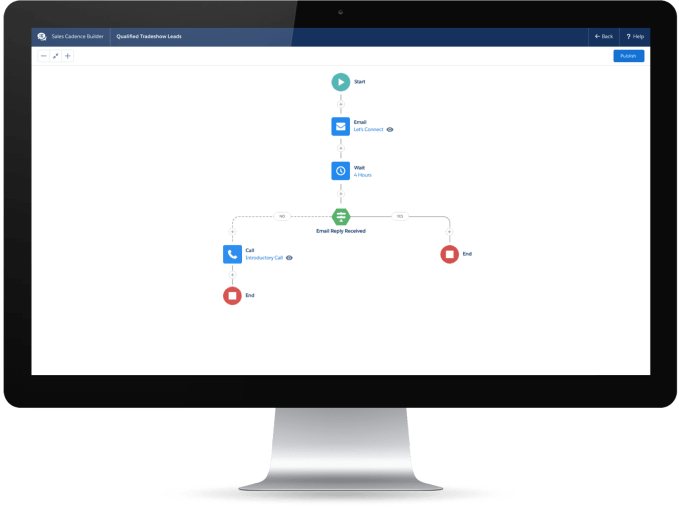Dreamforce, Salesforce’s massive customer conference is coming later this month to San Francisco, but the news is starting already well ahead of the event. Today, the company announced updates to its core Sales Cloud with an emphasis toward automation and integration.
For starters, the company wants to simplify inside phone sales, giving the team not only a list of calls organized by those most likely to convert, but walking them through a sales process that’s been defined by management according to what they believe to be best practices.
High Velocity Sales is designed to take underlying intelligence from Salesforce Einstein and apply it to the sales process to give sales people the best chance to convert that prospect. That includes defining contact cadence and content. For calls, the content could be as detailed as call scripts with what to say to the prospect. For emails, it could provide key details designed to move the prospect closer to sale and how often to send that next email.

Defining sales cadence workflow in Sales Cloud. Photo: Salesforce
Once the sales teams begins to move that sale towards a close, Salesforce CPQ (configure, price, quote) capabilities come into play. That product has its roots in the company’s SteelBrick acquisition several years ago, and it too gets a shiny new update for Dreamforce this year.
As sales inches toward a win, it typically moves the process to the the proposal stage where pricing and purchases are agreed upon, and if all goes well a contract gets signed. Updates to CPQ are designed to automate this to the extent possible, pulling information from notes and conversations into an automated quote, or relying on the sales person when it gets more complex.
The idea though is to help sales automate the quote and creation of bill once the quote has been accepted to the extent possible, even providing a mechanism for automatic renewal when a subscription is involved.
The last piece involves Pardot Einstein, a sales and marketing tool, designed to help find the best prospects that come through a company’s marketing process. This is also getting some help from the intelligence layer in a couple of ways.
Einstein Campaign Insights looks at the range of marketing campaigns that are coming out of the marketing organization, determining which campaigns are performing — and those that aren’t — and pushing the art of campaign creation using data science to help determine which types of activities are most likely to succeed in helping convert that shopper into a buyer.
The other piece is called Einstein Behavior Score, which again is using the company’s underlying artificial intelligence tooling to analyze buying behavior based on intent. In other words, which people coming through your web site and apps are most likely to actually buy based on their behaviors — pages they visit, items they click and so forth.
Salesforce recognized the power of artificial intelligence to drive a more automated sales process early on, introducing Einstein in 2016. In typical Salesforce fashion, it has built upon that initial announcement and tried to use AI to automate and drive more successful sales.
The core CRM tool that is the center of the Sales Cloud, is simply a system of record of the customers inside any organization, but the company is trying to automate and integrate across its broad family of products whenever possible to make connections between products and services that might be difficult for humans to make on their own.
While it’s easy to get lost in AI marketing hype — and calling their AI layer by the name “Einstein” certainly doesn’t help in that regard — the company is trying to take advantage of the technology to help customers drive more sales faster, which is the goal of any sales team. It will be up to Salesforce’s customers to decide how well it works.
No comments:
Post a Comment